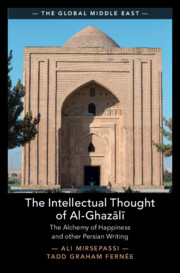Book contents
- The Intellectual Thought of Al-Ghazālī
- Reviews
- The Global Middle East
- The Intellectual Thought of Al-Ghazālī
- Copyright page
- Contents
- Acknowledgments
- Note on Transliteration
- Introduction
- 1 The Time and Life of Ghazālī
- 2 Reading Ghazālī in the West
- 3 The Poetic Imagination and the Politics of Ambiguity
- 4 The Troubled Orthodoxy in the Academic Study of Islam
- 5 A Path to Reform
- 6 A Cosmopolitan Reading of Ghazālī
- 7 Ghazālī’s Practical Ethics
- Bibliography
- Index
1 - The Time and Life of Ghazālī
Published online by Cambridge University Press: 16 January 2025
- The Intellectual Thought of Al-Ghazālī
- Reviews
- The Global Middle East
- The Intellectual Thought of Al-Ghazālī
- Copyright page
- Contents
- Acknowledgments
- Note on Transliteration
- Introduction
- 1 The Time and Life of Ghazālī
- 2 Reading Ghazālī in the West
- 3 The Poetic Imagination and the Politics of Ambiguity
- 4 The Troubled Orthodoxy in the Academic Study of Islam
- 5 A Path to Reform
- 6 A Cosmopolitan Reading of Ghazālī
- 7 Ghazālī’s Practical Ethics
- Bibliography
- Index
Summary
The chapter discusses Abdolhossein Zarirnkoub’s Persian-language biography of Ghazālī, Farār az Madrasa (Escape from Madrasa), which argues that Ghazālī’s intellectual formation was significantly shaped by the Persian mystical tradition of his time as well as by a broader Islamic tradition of learnedness. An appreciation of the historical and cultural confluence of the Abbasid and Seljuq Empires is crucial to explaining Ghazālī’s reformist vision. Within Ghazālī’s lifetime, the ideals and promises of the Seljuq state gave way to sudden, chaotic collapse, revealing in the process the malfunctioning of a self-professed regime of salvation. Ghazālī was a child of the Niẓām al-Mulk revolution in administration and politics, with its hopes for unifying the Seljuq and Abbasid states under the banner of justice and governance. Yet Ghazālī witnessed the sudden and tragic collapse of the Seljuq state, after Niẓām al-Mulk and Sultan Malikshāh were assassinated in an explosive chain of events. Ghazālī was witness to a failed state-building project, who nevertheless clung to the ideals of that lost revolution while plotting to reinstate its normative mission by other means.
- Type
- Chapter
- Information
- The Intellectual Thought of Al-Ghazālī , pp. 17 - 56Publisher: Cambridge University PressPrint publication year: 2024

